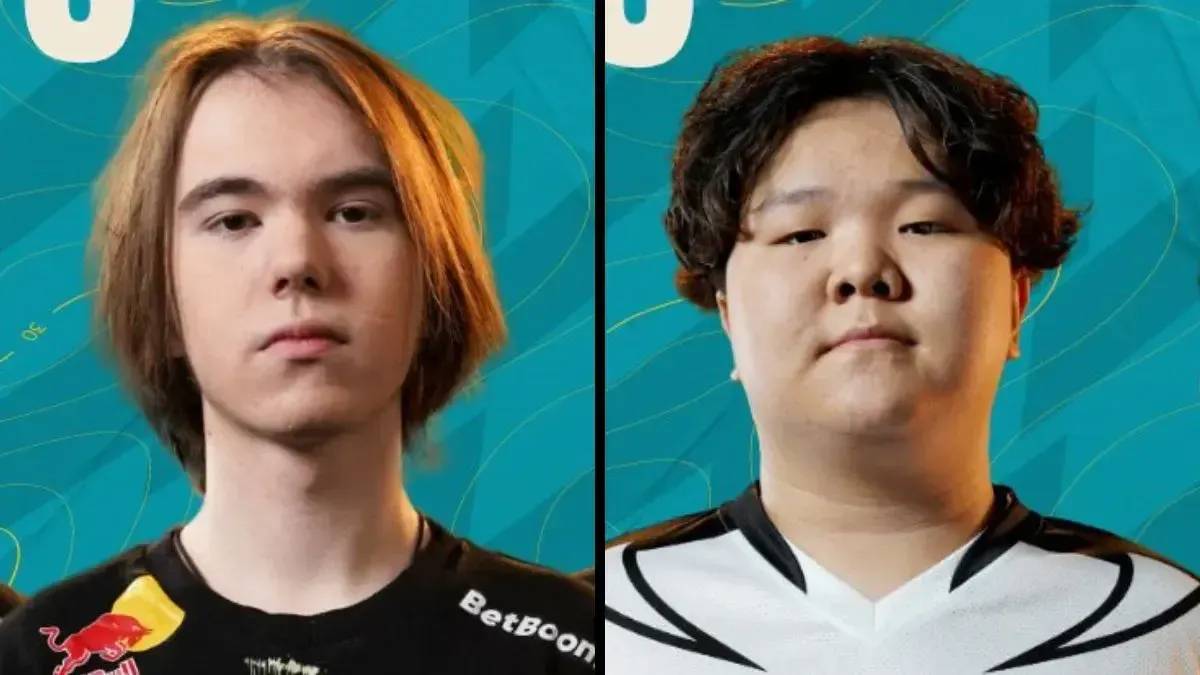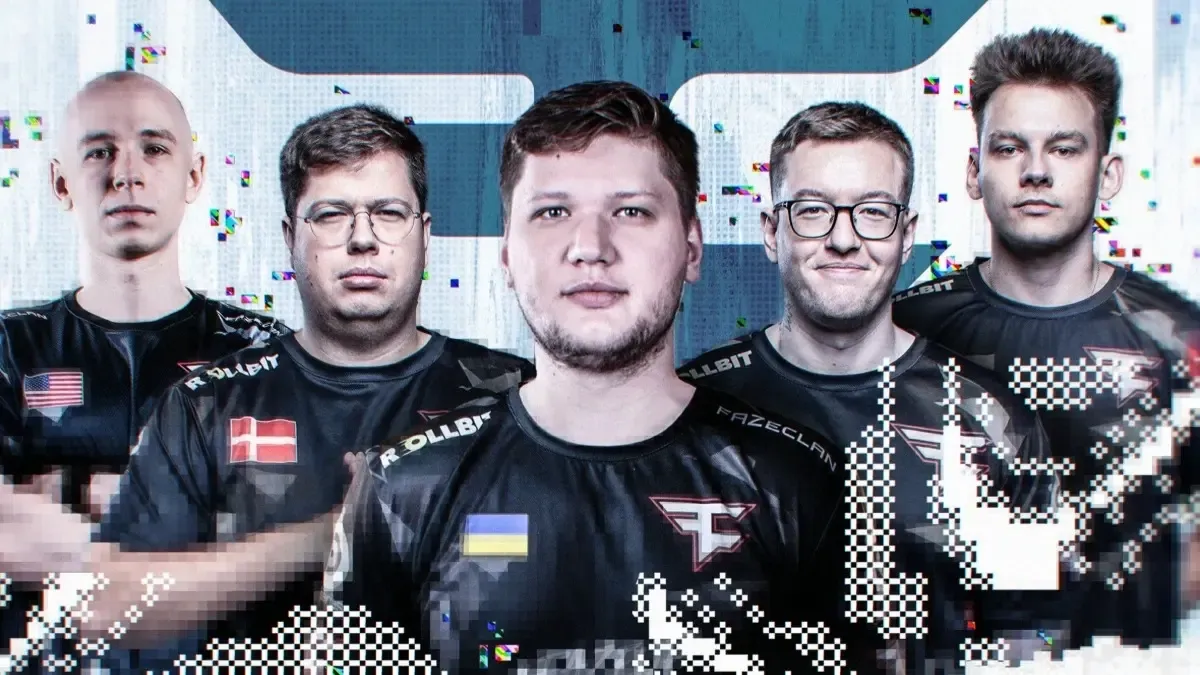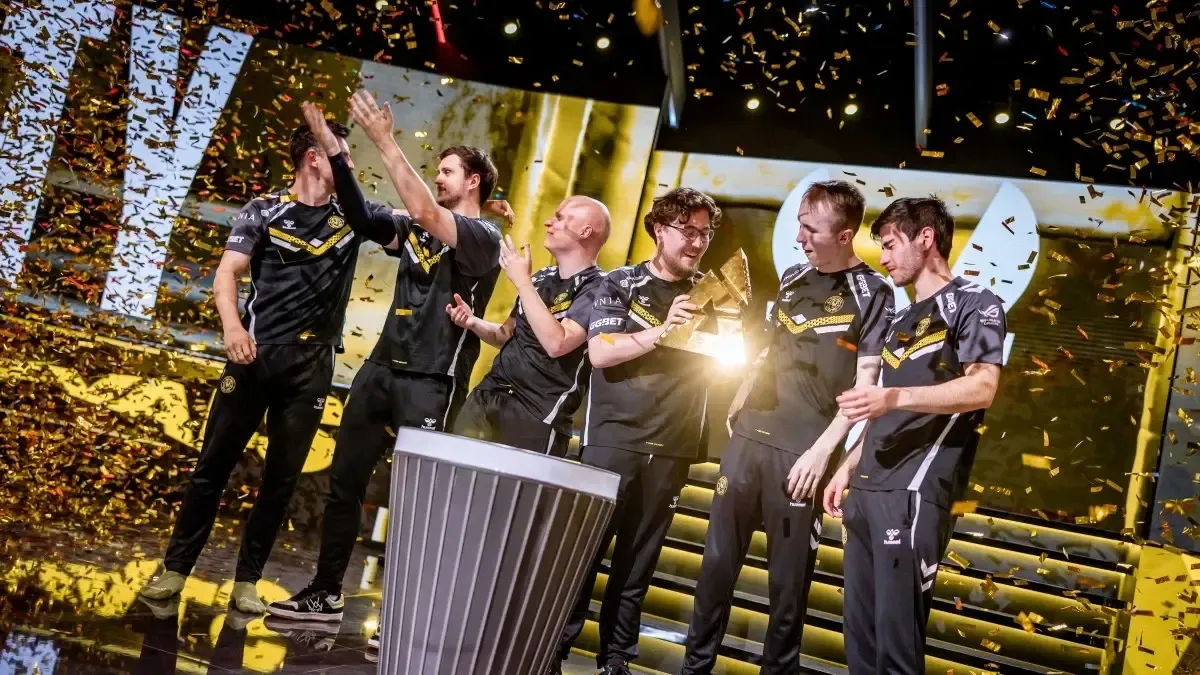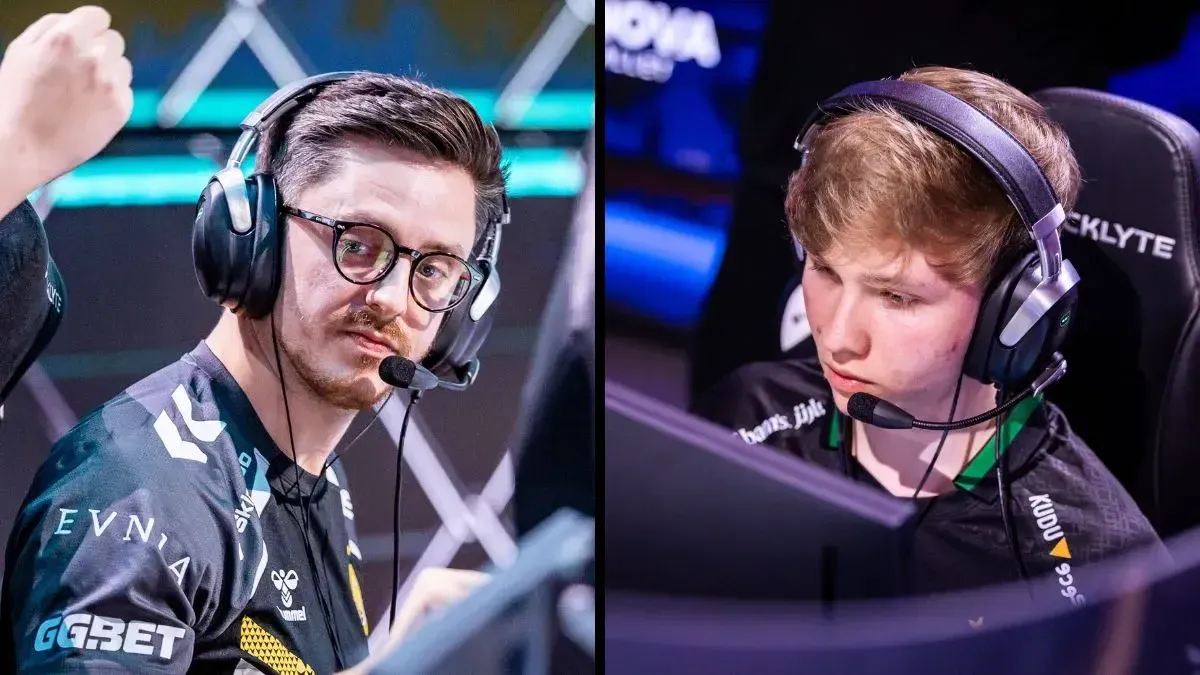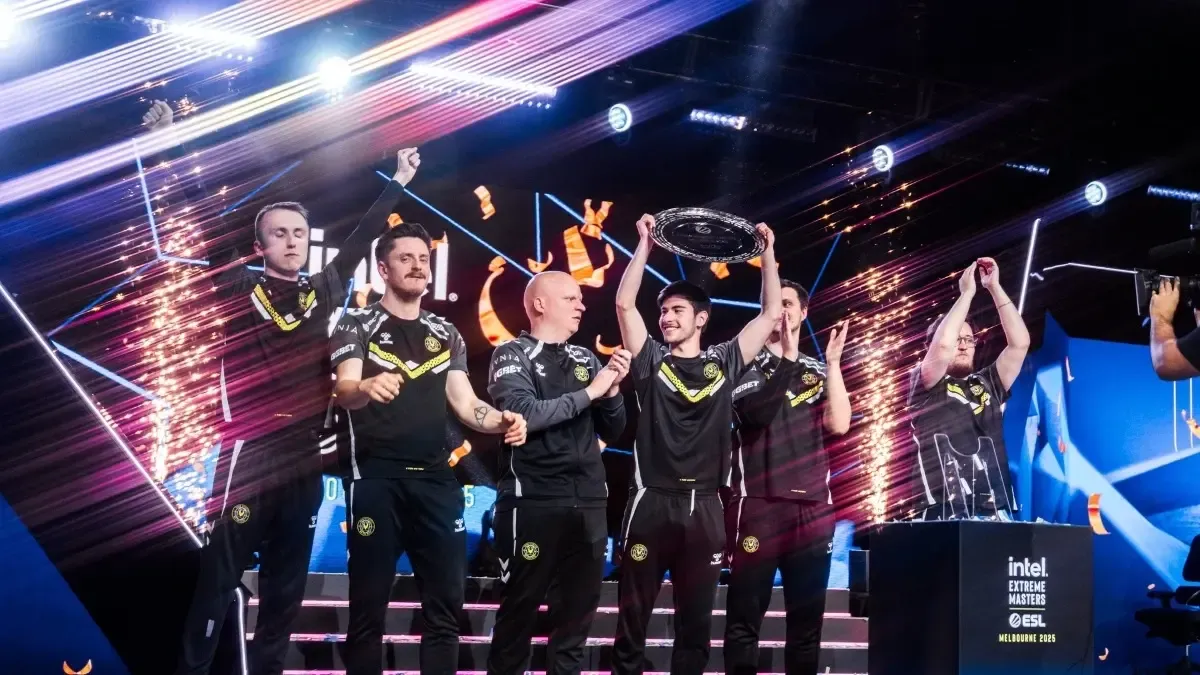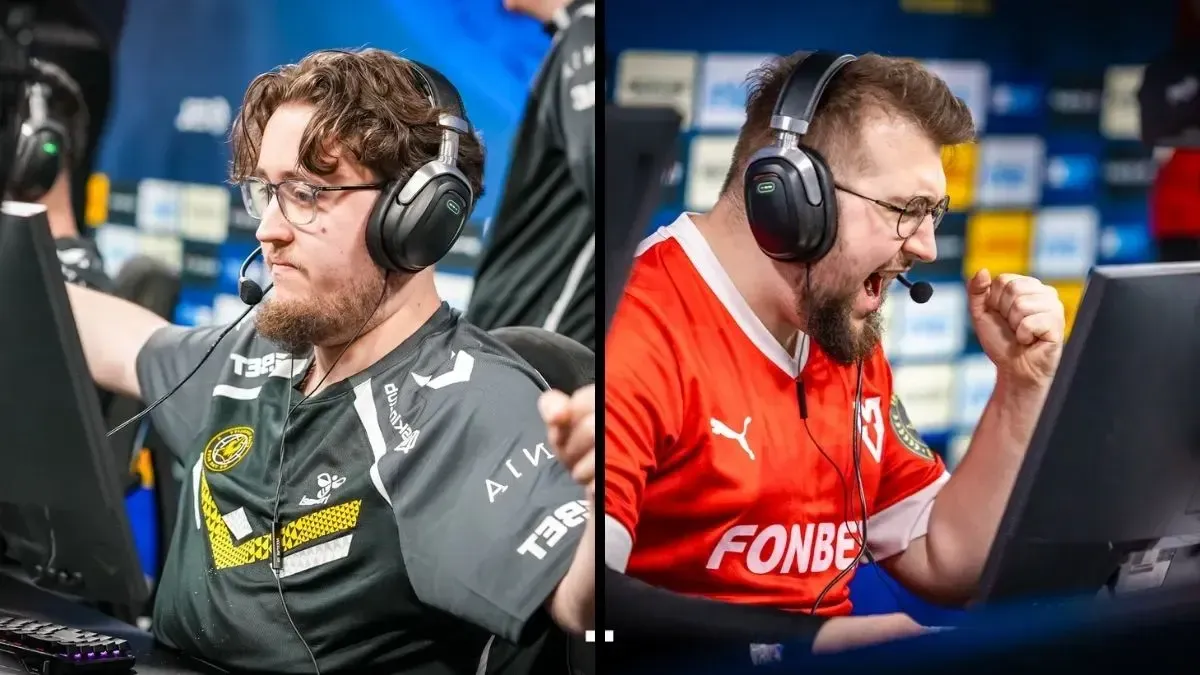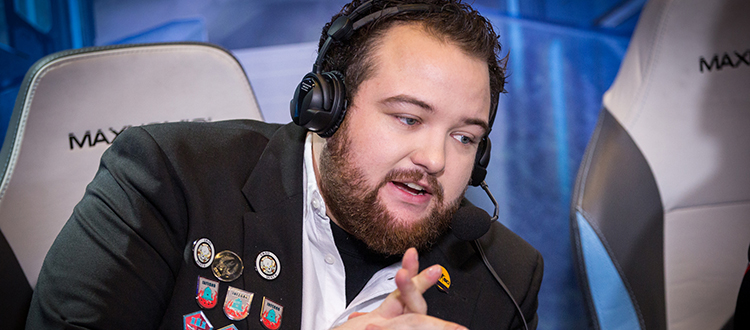
Photo by Patrick Strack and ESL.
Hey Anders, let's begin the interview with a few questions which are not about Esport and CS:GO. We all know what’s your job in esports, but do you have any other work outside of it and if so, how much time do you spend on that job during the week?
In the beginning I tried to juggle studying English while also working part time developing databases for a local company, but both of those things quickly had to end as casting took up more and more time. Since I guess mid 2013 I've basically had casting as my full time job.
How does a regular day in the life of Anders Blume look like?
Well at the moment things are unusually busy, with the baby and all. When I am at home usually the day will be some sort of mix of me working on various Room On Fire related things, trying to catch meetings with potential partners or sponsors or tournament organizers. This is usually a bit on and off because there is also every day things to take care of like, walking the dog, buying and making dinner, but then usually towards the evening there is some kind of casting which ends around 11-12ish and I end up in bed around 3-4 AM depending on how deep into whatever I'm doing I am! If I'm lucky I get to sleep to 9 or 10, if not then baby is up at 6 or 7 and things get a bit rough.
When did you start working as a caster? Being one of the most recognized persons in the scene, do you feel proud of what you’ve accomplished so far?
I started working as a caster Jan. 17th or 19th, I can never remember, 2013. I am definitely very proud, but pride is also something to be watched out of. It has a way of turning into arrogance or even if not that, into laziness. That feeling that "Oh now I've made it" is poison in my opinion. It's so tempting to feel that way because you start to feel you deserve it, but it's also often the beginning of the end.
"Being in front of the 10K people in the Spodek Arena in Katowice, and the million concurrent viewers tuning in from Twitch is definitely a career highlight so far."
You recently cast one of the biggest tournaments in CS:GO, ESL One Katowice. How would you describe the event from your point of view?
Being in front of the ten thousand people in the Spodek Arena in Katowice, and the million concurrent viewers tuning in from Twitch is definitely a career highlight so far. I am not sure even the most optimistic forecasts for CS:GO had seen this coming, and what's strange is, it feels like we are just getting started. The event itself from my point of view was amazing and I learned a lot being there, we still have a lot of things to improve overall, but if it wasn't clear already, the Katowice event showed the world that CS:GO is skyrocketing and wont stop anytime soon.
Who surprised you at Katowice?
Hard to say, I am not sure if Katowice was a tournament of big upsets, NiP showing a good form so soon after picking up Allu was definitely encouraging, and Key'd Stars were in my opinion still showing good signs.
Would you say it was one of your greatest moments in your history as a caster, or is there some other moment which you feel is more special?
Without a doubt, but the GamesCom 2014 tournament also feels like almost one big highlight for me too. Outside of that I have to admit to a certain pride in casting with Joe Miller back in the Raidcall EMS One days. Other highlights are slightly more obscure from an outside perspective I suppose, I've had some very cool fan run-ins in various places and some of those can be special too!
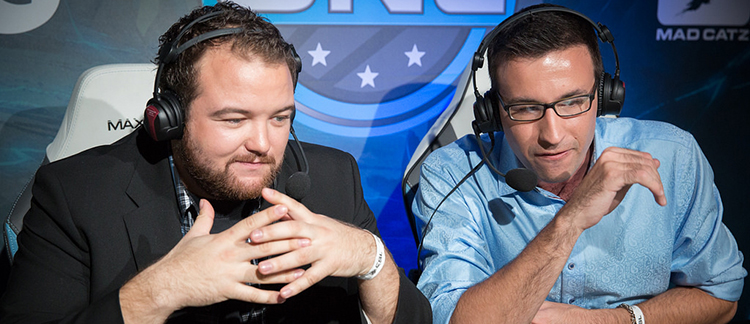
Photo by Kelly Kline and ESL
Was it a bit awkward for you to cast that tournament without Semmler, your colleague from RoomOnFire?
I don't know if awkward is the right word, but I was definitely sad he wasn't there. Next time though, next time!
How would you describe the way of working with Semmler? And how did you guys come up with the idea of creating RoomOnFire?
I'd say Semmler and I work in very different but somehow synergistic ways. I think part of the upside/strength is that we don't always agree on everything, yet can usually come to some of agreement or middle ground. The RoomOnFire idea basically came as NiPTV came to a close and it became obvious that running our own channel and company just made more sense in the long run, it is still a project under heavy development and I'd say it's unsure exactly where it will lead us.
Solo casting has a few benefits, but most of the time it is one of the most painful things to have to go through.
You show great synergy with Semmler, but you also cast solo. What do you find more easier, having a solo cast or having a co-caster?
Solo casting has a few benefits, but most of the time it is one of the most painful things to have to go through. It definitely allows you to fine tune the whole story telling aspect, because you will have nobody else to bounce anything off of, but it's very demanding for more than a single game. Having a co-caster and I guess particularly one I know as well as Semmler is super beneficial, it means there is room to have more fun, which also translates onto the audience tuning in. At the end of a good solo cast you're just happy to have made it through alive. At the end of a good cast with someone else, you wish you had ten more games like that to cast.
The community seems to be very appreciative of long-time casters and seldom support and applaud names they are not familiar with. We saw an example of this at Katowice. A recent editorial by Richard Lewis did mention this subject as well, so what is your opinion on that?
I don't know if this is different in CS:GO as opposed to other esports titles, but I suppose it's human nature. In a way this is one of those questions that it would probably be wiser to dodge entirely because the potential for saying something politically incorrect is pretty huge. The fact is that I am probably too much involved in this question to give an objective answer. When I started casting there weren't too much going on in CS:GO, but names like ReDeYe and Joe Miller were still occupying the streams over at ESL, so I also had to make a choice early on to stick with it, or try and fight and continue. Problem is, the path that I took then isn't there anymore. It is literally impossible now to repeat what happened to me, partly because there are no open GO:TV IP's anymore. I would say to anyone coming into the game now wanting to make a name for themselves, the key is persistence and hard work.
We all saw how supportive the community as a whole can be. There was a lot of threads calling for you, as everyone wanted to make sure that you cast the finals in Katowice. How did you feel about this, by seeing how your work is appreciated by the community?
Community support is everything. The fact that I have a job where I get to talk about something I find to be super exciting and fun, and that there are people out there who think I do it well enough that they want to hear more, that is a big source of motivation. I would say particularly now with my son being born and with our schedules also being swamped with meetings and such, it is a huge help. You can't do that just on fun alone. Although it is fun, it matters to me that there are people out there who expect me to put in the time and want me there.
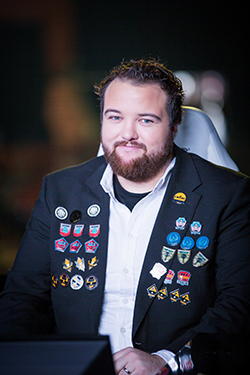
How would you describe your own style of casting?
Ahh, another chance to say something self flattering. One is tempted to give a one word answer to this and just say 'Perfect' just because the feedback would be hilarious. What I want to be able to do, is learn so much about the game that I can read what is happening before it happens, I think 'hindsight casting' can become very boring very quickly. I don't mind going through what happened in a round, if too much happened for us to cover during the actual play-by-play or if some cool detail that might have gone unnoticed by the audience wasn't picked up on.
So actually this will turn into a really long answer. What happens in a lot of esports casting is a very silly thing, that I am 100% guilty of doing myself, because it's such an easy mistake to make. And sometimes it isn't even necessarily a mistake either. I am not sure if there is a technical term for it, but essentially it's a way of attributing intentions to a sequence of events after they have happened. Okay so bare with me here, this explanation hopefully won't be too absurd.
Talking in CS:GO terms, a team may have a plan from the start of a round that they follow from start to end, it works, and we as casters explain what that plan was to the best of our knowledge. Easy and simple. But a lot of the time, the plan breaks down after the first frag, adjustments have to be made, you take into account what you've learned throughout that round and you come up with an adjustment to the original plan. The temptation here as a caster is to simply pretend that the adjusted version was somehow the plan all along. You re-tell the story of that round as if though what happened was sort of pre-destined to occur in that order. I very specifically want to work away from that as much as possible. I have no doubt that I do it myself a lot, and sometimes you're almost forced to because, and this is more true in CSGO than in other esports, you don't have time. You don't have time to slow down and say "actually maybe they had a different plan..." So the way to, if not avoid it entirely but at least cut down on it, would be in my opinion to try and predict a round or a tactic, based on what you're seeing. This is actually sort of dangerous enterprise as a caster, because you expose yourself to being horribly wrong. What I've dubbed 'hindsight casting' has the advantage of being, at least superficially, always right. But if you try to call a round early and you're just plain wrong, it's easy for critics to turn around and go "look, it's just like I said, he doesn't know what he is talking about."
The casters I know that feel the weight the most of this are Starcraft casters followed closely by Dota2 casters (I don't know how LoL is). I've seen live what happens when a Starcraft caster tries to guess what might happen, based on some theory he or she is explaining, and having it turn out the other way. I've seen the reddit threads and the community feedback that goes with that kind of "misstep". The key for me though is, as long as the theory was good, I care a lot less about how accurate the outcome is. The beauty in fact for me, is that if a theory is presented well enough and is based on actual game knowledge, it can be used almost more effectively when the predicted outcome is different from what the theory would suggest. Let me try and specify what I mean. In CS:GO terms, if I see a player in a 4vs1, I will feel no guilt in predicting that the lone player, is pretty much dead. It is simply too easy at a high level of CS:GO to set up crossfires or trade scenarios, making a 1v4 practically impossible. If I outline how much of an impossible situation this is, and the miracle happens, which we've all seen that it in fact does from time to time, then the model or theory actually serves as a tool to explain just how utterly incredible what just happened was.
So how does this relate to my style of casting? Well, like I said I want to try and challenge myself and explain what I think is likely to happen based on what I know, and I what the level of my knowledge to be good enough that if I am paired up with a colour casting. That is, an ex professional let's say, then that person can skip some of the basic stuff that I go through and focus on more in-depth things. Or even better, maybe disagree and explain why what I'm saying isn't correct, that way we all learn. I try very hard not to worry about being wrong. But I also work very hard to make sure that I say the least amount of 'wrong' things possible. There is a whole discussion to be had here about the terms 'right' and 'wrong', but this answer is already so long that only about 10% of people are still reading this interview.
What is your biggest weakness when it comes to casting?
I am not very good at doing proper research for events and such. I mean, I do a lot of research, I just keep it all in my head, which is stupid. I need to work at building better story lines between events and for teams, not just who won what, but also incorporate statistics properly and find a professional and smooth way to fit them into a broadcast. This is probably another one of those questions that should've been skipped entirely but it's too late for that now!
Basically the youtube series "Theorycraft" is my platform to be as wrong as I can possibly be.
Recently you started working on YouTube guides, which were very warmly accepted. How did you come up with the idea of creating these?
Well, this ties in rather nicely to my epic essay about casting further up. Basically the youtube series "Theorycraft" is my platform to be as wrong as I can possibly be. It's where I can come up with insane and irrational theories and have them laughed and tested by the community, without too much of a risk factor. It's just entertainment right, if I am wrong and you don't like it, you can just turn off the video. But the goal long term, is to have people discussing things, things that maybe they wouldn't otherwise. If it turns out the product of that discussion is somehow useful, well that would make it all worth it.
Do you expect more 1.6 players to come back now when CS:GO is breaking all the limits and becoming one of the top games in the Esport? If so, is there a specific player which you would like to see back in action?
It's hard to say, a lot of the 1.6 pros have lives and jobs and careers that they can't just easily quit. There are plenty that I would like to see back in action, some have already hinted that they might. Ave as a former Danish IGL who did very well during the mTw days. Zonic recently hinted that he might start playing. One of my own favourite players from a lot further back was Danish player called KK, who used to play for a team called Titans. Oh also Wantz, from the Danish CSS scene.
Is the European scene a step ahead compared to the NA teams? Do you think that Keyd Stars move will help the NA scene get stronger and more stable on international level?
With regards to Key'd the answer is a definite yes, they have some amazing talent and they are one of the most exciting teams to watch. The European scene is definitely a step ahead, but it doesn't have to be true forever really. I think a lot of the reason why that is, though, is because of the practice culture in EU versus NA. A lot of the NA players I speak with tell tales of practice games where the object for some if not all players' main goal is to win, and not to learn or practice a certain thing. Either that or of practice evenings that span 6-8 hours, but where the focus disappears after the first 2 or 3 hours. All of this can be fixed, all of it.
A newly formed team Kinguin with Maikelele and ScreaM has attracted a lot attention in the scene. How well do you expect them to do, considering that they are built as an international team?
I think the problem with Kinguin is communication, but at the same time it's hard to not be intrigued by the star power in that lineup. It's been sort of a mantra in Counter-Strike team formation history, that having 5 stars just isn't enough. But if they overcome that challenge and can actually make it work, well, they have potential to make CS:GO history, and that is pretty cool.
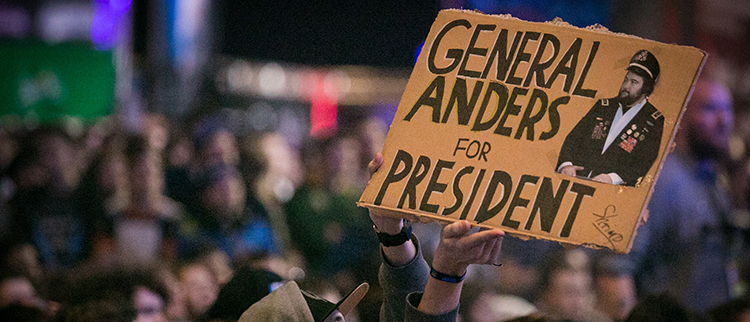
Photo by Bownik and ESL.
What can we expect in the near future from you, maybe more of General Anders?
General Anders will no doubt return. In the near future we've been building some pretty cool things, and we are working a lot on the RoomOnFire brand as well as a bunch of other things too. We are very much focused on how to help create a healthy future for CS:GO, so a lot of our time is spent in meetings and trying to plan what that future might look like. We hope to be able to bring some more life to the twitch channel, and if we have the time we would love to return to the podcasting enterprise that sort of got put on hold.
What would you change in CS:GO if you could?
I've actually stopped playing this game since I started having serious discussions with VALVe at events and through emails. I used to spend a lot of time thinking 'stupid VALVe, why don't they just change/tweak/adjust THIS' thinking whatever solution I had in mind was so obvious. But it turns out game design is a little more complicated than that, and I now spend a lot of time thinking things through before I start complaining about something. Once you factor in things like cost/benefit, how much time it takes to fix something versus how big of an issue it is, it becomes tricky. I am not trying to be like a VALVe spokesperson here, I am just saying my own perspective on a lot of this has changed.
Really though, I'd like to see matchmaking and CSGO supported in the Asian region.



Headline and General Anders images by Helena Kristiansson and ESL.
More content on GosuGamers:






